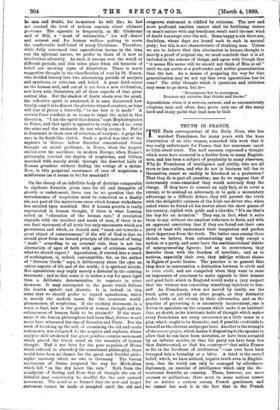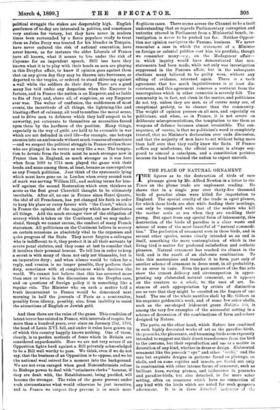TRUTH IN FRANCE.
THE Paris correspondent of the Daily News, who has watched Frenchmen for many years with the keen observation of an able woman, remarked this week that it was really unfortunate for France that her statesmen cared so little about truth. The naïf sarcasm expressed a thought which must have occurred in a feebler form to many English- men, and has been a subject of perplexity to many observers. Why do Frenchmen of intelligence and ability, who are all more or less realists, and who do not in business tell lies to themselves, resort so readily to falsehood as a protection ? That they do is past all question ; nor do we suppose that if courteously cross-examined they would seriously deny the charge. If they have to conceal an ugly fact, or to cover a retreat, or to mislead an adversary, or to gain a momentary advantage in a difficult debate, they will pervert the truth with the delightful coolness of the Irish car-driver who, when asked where he found all his stories about the show places of his country, replied with pride and a chuckle, "It's me that's the boy for an invintion." They say, in fact, what it suits them to say, without the smallest reference to facts, and with an apparent conviction that if they are found out their own party at least will understand their temptation and pardon their departure from the truth. The better ones among them shrink, we believe, from calumniating any body except a nation or a party, and some have the mathematicians' dislike of misrepresenting figures ; but as to occurrences, they describe them with the freedom of novelists ; and as to motives, especially their own, they indulge without shame in flights of poetic license. The practice is so general that they draw in conversation a distinction between la verite and is vraie verit&, and are compelled when they want to raise an impression of exactness to make appeals to their honour and good faith which in England would make a jury suspect that the witness was concealing something injurious to him- self. As Frenchmen, when not moved by vanity, see the truth quite as quickly as other people, as they distinctly prefer truth at all events in their adversaries, and, as the practice of perverting it is excessively inconvenient, one is driven to speculate on the reasons which make it so habitual. One, no doubt, is the histrionic habit of thought which makes every Frenchman see every occurrence as a little scene in a play, which ought to be dramatic, and if possible creditable to himself as the obvious an dproper hero. Another is the strength of the amour propre, which makes it disgusting to the speaker to allow that he can have been mistaken, or have been actuated by an inferior motive, or that his party can have been less than disinterested, or that his country—" that noble France so far in the forefront of civilisation "—can ever have been betrayed into a brutality or a Wise. A third is the rooted belief, which, we have noticed, impairs truth even in English- men, that the world can only be managed by adroitness, diplomacy, an exercise of intelligence which only the dis- courteous describe as cunning. These, however, are mere excuses or palliatives ; there must be some serious reason for so Asiatic a custom among French gentlemen, and we cannot but seek it in the fact that in the Frenoh political etruggle the stakes are desperately high. English gentlemen of to-day are interested in politics, and sometimes very anxious for victory, but they have never in modern times been surrounded- by -a fierce populace ready to treat them as Jules Ferry was treated for his blunder in Tonquin, have never endured the risk of national execration, have never known, as for instance the older Liberals of France have all known, what it means to live under the risk of Cayenne for an imprudent speech. Still less have they known what it is to play with their heads as men are playing in this Dreyfus affair, to know if opinion goes against them that on any given day they may be thrown into fortresses, or deported to the tropics, or ordered to stand shivering against a wall while the soldiers do their duty. There are a good many lies told under any despotism when the Emperor is furious, and in France the nation is an Emperor, and as liable to fits of fury, and, above all, of suspicion, as any Emperor ever was. The welter of confusion, the suddenness of most events', the incertitude of all things, the lightning-like and blasting effect of calumny, all tend to confuse the moral sense, and to drive men to defences which they half suspect to be unworthy, yet extenuate to themselves as necessities forced upon them by the hardness of the position. Many things, especially in the way of guile, are held to be excusable in war which are not defended in civil life—for example, one betrays enemies into an ambuscade without much remorse of conscience —and we suspect the political struggle in France strikes those who are plunged in its vortex as very like a war. The tempta- tion to deviate from the truth mast be much stronger now in France than in England, as much stronger as it was here when from 1688 to 1714 men played the game with their heads, and some among them, at least, became as unscrupulous as any French politician. Just think of the systematic lying which must have gone on in London when every second man of mark was serving William III., and making terms for him- self against the second Restoratian which even thinkers as acute as the first great Churchill thought to be ultimately inevitable. After all, no one in France since Henri Qnatre, the idol of all Frenchmen, has yet changed his faith in order to keep his place or curry favour with "the Court," which is in France the opinion of the majority which now distributes all things. Add the much stronger view of the obligation of secrecy which is taken on the Continent, and we may under- stand, though we cannot excuse, the conduct of many French statesmen. All politicians on the Continent believe in secrecy on certain occasions as absolutely vital to the organism and quiet progress of the State. They never forgive a colleague who is indifferent to it, they protect it in all their servants by severe penal statutes, and they come at last to consider that it involves their personal honour. To tell lies in order to keep a secret is with many of them not only not blameable, but is an imperative duty ; and when silence would be taken for a reply, and evasion is no longer possible, they perform their duty, sometimes with a] completeness which deceives the world. We cannot but believe that this has occurred more than once or twice in the discussions on the Dreyf as case, and on questions of foreign policy it is something like a regular rule. The Minister who on such a matter told a truth inconvenient to France would be denounced next morning in half the journals of Paris as a semi-traitor, possibly from idiotey, possibly, also, from inability to resist the attractions of English or Jewish gold.
And then there are the rules of the game. This condition of latent terror has existed in France, with intervals of respite, for more than a hundred years, ever since on January 21st, 1793, the head of Louis XVI. fell, and under it rules have grown up of which this country happily knows nothing. One of them, clearly, is to pardon methods of fence which in Britain are considered unpardonable. Here we are not very severe if an Opposition fights hard against a Bill privately acknowledged to be a Bill well worthy to pass. We think, even if we do not say, that the business of an Opposition is to oppose, and we let the national weal retreat for a moment into the background. We are not even enraged when good Nonconformists refuse to Bishops power to deal with "criminous clerks" because, if they are dealt with, the Establishment, being purified, will become the stronger. The rules of the game prevent under such circumstances what would otherwise be just invective, and in France we suspect they prevent it in much more
flagitious cases. There seems across the Channel to be a tacit understanding that as regards Parliamentary corruption and untruths uttered in Parliament from a Ministerial bench, in- vestigation is never to be pushed too far. Neither Opposi- tion nor opinion castigates the Panama business. We never remember a case in which the statement of a Minister on foreign or colonial politics cost him his portfolio, though we remember many—e.g , on the Madagascar affair— in which inquiry would have demonstrated that mis- statements had been made, while not only was investigation suppressed in the Panama affair, but in the subsequent elections many believed to be guilty were, without any sifting of evidence, returned again. There is a tacit agreement that too much inquisitiveness is at least dis- courteous, and this agreement removes a restraint from the unscrupulous which in other countries is severely felt. The community is, in fact, not clean in the matter, and politicians do not try, unless they are men, as of course many are, of exceptional probity, to be cleaner than the community. The weight of opinion presses on all men, and especially on politicians, and when, as in France, it is not severe on deliberate misrepresentations, the temptation to use them as weapons of defence becomes almost irresistible. The con- sequence, of course, is that no politician's word is completely trusted, that no Minister's declaration ever ends discussion, and that the majority of men have to act without being more than half sure that they really know the facts. If France suffers any misfortune, the official account is always sup- posed to conceal a cataclysm, and a constitution perishes because its head has trained the nation to expect untruth.







































 Previous page
Previous page